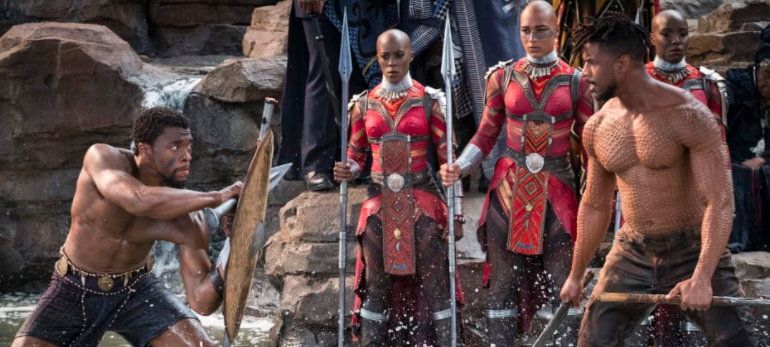Wakanda forever
Director Ryan Coogler’s highly anticipated film, Black Panther, hit theaters on February 16. The movie created buzz because it is one of the first superhero movies to feature such a predominantly black cast. Black Panther is also the next installment in the Marvel Cinematic Universe (MCU), which is Marvel Studios’ current 18-film long creation that features heroes such as Captain America, Iron Man and Thor.
“I think it was one of the top three films in the MCU behind The Avengers and Captain America: Civil War,” senior Julian Hinkson said.
Black Panther tells the story of King T’Challa (Chadwick Boseman) of Wakanda, a fictional African nation. Following the events of Captain America: Civil War, the movie begins with T’Challa about to ascend to the throne after the death of his father, King T’Chaka. He must defend the crown from his cousin, Erik Killmonger (Michael B. Jordan), who was raised in America and whose ideologies clash with T’Challa’s.
While Black Panther has all the key features of a superhero movie, Coogler also deals with deeper themes and emotions than are typically seen in the genre. The film’s villain is not the stereotypical evil mastermind, rather, he is a character with whom audiences can sympathize. This makes for a powerful film, especially to audiences who are not used to seeing such positive, energetic portrayals of black characters.
“Black Panther gave me a simulation of a culture I was not completely familiar with but long to make connections with,” Hinkson said.
To many, Black Panther is more than a movie–it’s a cultural moment. It breaks the mold of the typical Hollywood film, in which black characters are often used for comedic relief, or, if they are featured, it is in the context of fighting for rights.
“It was really well made. It showed black power in a fictional story, but it brought forth a real sense of black pride to the black people watching it,” senior Leonie Alder said. “As a black person, I rarely see myself in the heroes in movies and books, but Black Panther has these strong black protagonists, not just some black best friend or sidekick.”
12 days after its release, Black Panther had made $421.8 million domestically, passing Wonder Woman as the 5th-highest domestically grossing superhero movie of all time. In that category, it is only behind The Dark Knight Rises ($448m), Avengers: Age of Ultron ($458m), The Dark Knight ($534m) and The Avengers ($623m). These numbers give hope to those hoping to see more black representation in future films.
“One of the reasons black people weren’t cast in big roles or in budget movies is because Hollywood was worried that it wouldn’t sell,” Alder said. “They were wrong.”











